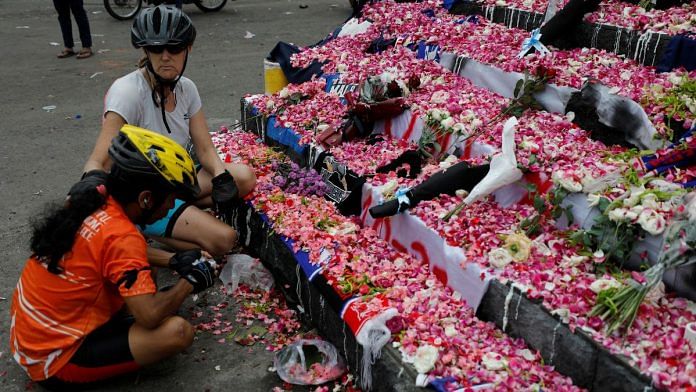Jakarta: It was the closing stages of the match, a soccer derby in Indonesia’s East Java province, and 29-year-old spectator Ahmad Nizar Habibi said he had a gut feeling things were about to turn ugly.
“I wanted to leave, but suddenly I heard explosions,” he said, describing rounds of tear gas fired as Saturday’s night-time match ended and fans invaded the field, angered by the home team’s loss.
“We couldn’t see. Fans were screaming and we couldn’t breathe,” said Habibi.
The chaos that erupted in the soccer-mad Southeast Asian nation resulted in 125 dead and more than 400 injured, plunging a sleepy town on the main island of Java into shock and mourning. The victims were mostly fans of the local Arema FC team in Malang.
Comments from spectators, police and experts who spoke to Reuters as well as video footage indicate the disaster was caused by a confluence of factors – a crowd beyond the capacity of the stadium, angry fans, the firing of tear gas by police and, tragically, some locked exits.
The use of tear gas, a crowd-control measure prohibited by world soccer governing body FIFA, has come under scrutiny and police have said the decision to do so was one of the issues being investigated.
Yusuf Kurniawan, a respected commentator on football in Indonesia, said while the tear gas was fired to disperse fans who had invaded the pitch, it floated up to the stands.
“People panicked and they were suffocated as they struggled to find the exits,” he said.
Some spectators said at least three exits at Kanjuruhan Stadium were locked on Saturday night, leading to a crush and stampede. Most of the deaths were near the stadium’s Gate 13, one of those locked, some people said.
Albertus Wahyu, a commissioner with the national police commission watchdog, said on Tuesday that some exits were locked but it was unclear who had locked them and why.
A director from PT Liga Indonesia, the domestic soccer league, said he was unable to respond to queries given an investigation was ongoing. A spokesperson from Arema FC was not immediately available for comment.
Spokespeople for the national and East Java police declined to answer questions on the security measures but on Monday, 10 officers were suspended pending an investigation.
“We heard the doors were closed, or some doors, and that many people couldn’t get out so I decided to wait. I couldn’t breathe and my eyes hurt,” said Haura, a 20-year-old university student who said she fainted in the stands. Like many Indonesians, Haura uses only name.
Medics said people caught in the crush mostly died from suffocation and head injuries, while officials have confirmed that 33 minors were among the dead.
“We were wrong,” said Habibi, of the angry Arema fans who streamed onto the pitch and threw rocks, and later set police cars alight outside the stadium, “But what the police did was also wrong.”
Some spectators claimed police fired tear gas directly into the stands, while footage shows officers kicking and beating fans with batons.
‘Collective mistakes’
With the country seeking answers, the spotlight is on the police, but experts say the true picture is more complicated.
In trying to pre-empt risks, the police had banned fans from the rival Persebaya Surabaya side from attending and asked for the ‘high-risk’ match to be held during the day, when policing is easier, said Akmal Marhali, coordinator of private football watchdog organisation, Save our Soccer (SOS).
Surabaya is about 100 km (60 miles) north of Malang and matches between the two East Java sides have often been tense.
Akmal said the match went ahead at night with organisers printing 42,000 tickets for a stadium designed to hold only 38,000. No tickets were however sold to Persebaya fans, police said.
“We cannot only blame the police. These are collective mistakes,” Akmal said.
In the match, Arema went two goals down to Persebaya in the first half but managed to draw level before the break. The home side conceded early in the second half, and its 3-2 defeat to the bitter rival on its home turf was the first in 23 years.
Home side fans invaded the pitch as the game ended, while the players rushed to the changing rooms, according to video footage.
Awang, a 52-year-old Arema fan, said he left before the final whistle blew. He said he took shelter in a nearby shop as the chaos unfolded, and returned to the stadium later.
“What I saw was terrifying. There were dead bodies in the prayer room, 17 bodies as I remember,” he said, “Many of my fellow supporters were crying hysterically.”
Football hooliganism and violence is not new in Indonesia – data from SOS shows that 86 people have died in soccer-related violence in Indonesia since 1995 – but the severity of this tragedy has shocked the nation.
Kurniawan, the commentator, said in the past violence at soccer matches had failed to bring change, but this time it had to be different.
“Our mentality needs to change because managing football is like managing a country. This is a mirror, a portrait of our nation,” he said.-Reuters
Also read: 17 kids among 125 killed in Indonesia stampede, for some it was their first time at a stadium



